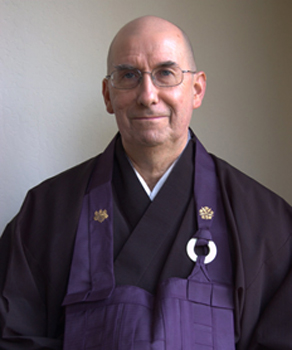Article by Central Abbot Myōgen Steve Stücky
Photo by Renshin Bunce
I’m grateful to those SFZC sangha news readers who requested a statement from SFZC leadership in response to the NYTimes article citing allegations of abusive behavior toward female students by a well-known Japanese Rinzai Zen teacher.

photo by Renshin Bunce
Rumors of sexual misconduct in this case have been passed along for decades, but little if any corrective action has been taken by the local sangha. It is very difficult for students to discipline their own teacher, or to speak out unless the community has a safe venue for “whistleblowers.” My sympathy goes out to all those who have been harmed, whose deep spiritual trust has been betrayed by the very person they trusted most deeply. Such wounds can be emotionally devastating and the student may suffer in silence and confusion for years, not knowing where to turn. In this case, a recently established Witness Council of other Zen teachers from the American Zen Teachers Association, who are not members of the offending teacher’s community, have made themselves available to receive statements from those wronged. Such statements contribute towards the development of a body of evidence to be presented back to the particular group’s Board of Directors for them to take clear corrective action.
Here, at San Francisco Zen Center, we have a dozen or more transmitted teachers and many additional practice leaders. We need to focus on emphasizing our clear ethical standards to prevent such abuses by any of us, and refresh our understanding of the serious harm that can be caused by sexual misconduct. It is important for our SFZC sangha to actively examine the dynamic interplay of privileged and dependent positions in order to protect the health and safety of the teacher-student relationship that is so central to our way of practice.
It is an important point of our practice to bring the light of awareness to harmful situations as quickly as possible so that remedial actions may be engaged to stop the harm. This relates broadly to the oppressive impact of privilege in any form, whether it be male privilege, white privilege, or the privilege associated with wealth, or positions of power, status, or seniority. Because many cultural assumptions and institutional structures support privilege, it takes a strong commitment to examine and be willing to change our own assumptions. There is always much more that we can do.
The SFZC community has been sensitive to the challenges inherent in relationships where power is unequal, particularly since the revelations which surfaced in the mid-80s. It was clear that the status quo was unhealthy, so Zen Center reorganized to distribute administrative power more equitably and to clarify appropriate venues and boundaries for spiritual authority. We investigated our own blind assumptions and worked to create clear guidelines and safeguards within our community. We studied the issues and consulted with Dr. Peter Rutter, author of the book: Sex in the Forbidden Zone, When men in power—therapists, doctors, clergy, teachers, and others—betray women’s trust. Our research led us to create the ethical guidelines approved by the Board of Directors, which we continue to review and have currently posted on our website. In regard to the precept of refraining from sexual misconduct, our policy states, in part:
“…. it is considered a misuse of authority, responsibility, and sexuality for a Zen Center teacher to engage in sexual behavior with his or her student. If a teacher and/or student feel at risk of violating this guideline, they should suspend their teacher-student relationship at least until they have sought counsel with a senior Zen Center teacher. Furthermore, it is considered a misuse of sexuality for a teacher at Zen Center to form a sexual relationship with a former student within six months of the termination of the student-teacher relationship. Before forming a sexual relationship, all Zen Center priests, head students, or other persons in a formal role that entail clear advantages of influence in relationship to others should discuss the appropriateness of the potential relationship with a teacher or practice leader.”
Since we currently are fortunate to have important peer relationships among dharma teachers at SFZC, we engage with each other in accountability. And we bring in third party mediators and trainers to help us see more clearly. In recent dharma talks, Abbesses Christina Lehnherr and Linda Ruth Cutts each reminded people of our guidelines and of each person’s responsibility to come forward and speak up if there was any problem with anyone in a position of authority here. Though we intend to hold the highest standards of impeccable behavior for ourselves, there is always room for improvement, of being more mindfully aware of how one’s own behavior impacts another.
As a member of the American Zen Teachers Association and the Soto Zen Buddhist Association, I, and other teachers here at SFZC, participate in the process of developing professional standards of ethical conduct for ourselves as priests and as teachers. In the past several decades, there has been a broad-based growing societal awareness of the profound long-term harmful consequences of sexual impropriety by those in positions of trust and responsibility. Since we are human beings with all of our karmic tendencies, we will always need to renew our vows, continually educate ourselves, clarify our ethical principles, and hold each other accountable.
In the book, Sex and the Spiritual Teacher (Wisdom Publications, 2011), the author Scott Edelstein explores the reasons sexual transgressions occur in spiritual communities. He cites available research and offers insight into the causes and conditions of misconduct, how spiritual communities can prevent such abuses, and what to do when they occur. All teachers and leaders as well as members of boards of directors should read this book. And all those seeking a spiritual teacher or who are in such a relationship would be wise to study it. Scott concludes the book with “An Open Letter to Spiritual Teachers,” closing with the lines: “We need you to love us. Not sexually, and not in some idealized, storybook way, but as someone whom we can trust to act in our best interests, over and over. Without this love, you cannot serve wisely. We also need you to love yourself, for the same reason.”
If you have additional resources or insights to offer, please reply to sangha news (sanghanews@sfzc.org), or contact me through my assistant at centralabbotassist@sfzc.org, or other teachers at Zen Center.
May all beings live in safety,
Myōgen











